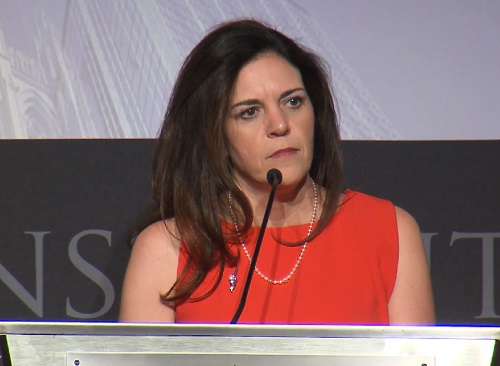
Of all the speeches at the Acton Institute’s 2018 annual dinner, perhaps the one that combined the greatest emotional impact and intellectual heft into the fewest minutes came from Margarita Mooney. The associate professor at Princeton Seminary, Acton University alumna, and decades-long visitor to communist Cuba gave the invocation after a five-minute-long discussion about how socialism crushes the human spirit, violates personal dignity, and reduces people to selling themselves in prostitution for survival when all other businesses are prohibited.
Mooney recounts the searing images she saw in her mother’s native Cuba, beginning when she was a junior at Yale.
“My very first night in Havana, a male prostitute called my hotel room. He knew what room I was in, and he knew I was alone,” she said. “I threw all the plastic furniture in front of my room’s door, and I knelt down by my bed, praying to God for protection.”
Mooney found heartbreak and hope during her seven trips to the hemisphere’s first communist nation.
“I saw what happens to the human heart when people are prohibited from starting a business, punished for going to church, and denied access to information other than that which comes from the communist government,” she said. “All around me men and women were using their bodies as instruments of market exchange.”
Her observations could be applied throughout economically collectivist nations.
New economics meets the world’s oldest profession
The same problem attends modern-day Venezuela, where a decade of Bolivarian socialism has reduced the nation’s exports to one: a desperate population willing to do anything to survive.
In some brothels in neighboring Colombia, 58 of 60 prostitutes hail from Venezuela. “We’ve got lots of teachers, some doctors, many professional women and one petroleum engineer,” a brothel owner, Gabriel Sánchez, told the Miami Herald. “All of them showed up with their degrees in hand.” All now work as prostitutes for $25 an hour.
“If you had told me four years ago that I would be here, doing this, I wouldn’t have believed you,” said one of the women, Dayana.
Similar scenes unfold in economically ravaged, and collectivist, Greece. “I had a flower shop for 18 years — and now I’m here out of necessity,” a middle-aged woman named Dimitra, a middle-aged woman told the New York Times. The newspaper of record reported that “the number of prostitutes in the city had increased by 7 percent since 2012, yet prices have dropped drastically,” by 56 percent, to just €17 ($19.37).
Alas, the law of supply and demand applies to every market, licit or illicit.
Mooney’s tale of prostitutes so desperate they would encroach on young women should shake everyone who cares about women’s rights (and shame everyone who wears a Che Guevara sweatshirt). Yet in an era of #MeToo activism, the plight of these women – their victimization – has had no other voice.
Thankfully, Mooney’s brief remarks give reason for hope, and an antidote to soul-crushing conditions.
Mother Theresa, #MeToo, and human dignity
In the midst of the bleakness of totalitarian oppression, the thirst for freedom cannot be extirpated from the human heart. “My trips to Cuba made real to me what the Bible tells us: God gave us freedom,” she said, “and these present struggles, no matter how hard they are, can never take that away.”
Mooney underlined the fact that the world’s most truly progressive leaders in social justice – she named Mother Theresa among them – had a holistic view of human dignity. It applies to all God’s children, regardless of race, sex, ethnicity, caste, or any other immutable characteristic. The Western tradition holds that this dignity affords the right to work at lawful businesses and own private property in order to support herself and her family in a manner befitting that dignity.
She also hailed the Acton Institute, “an always-growing community of faith-filled, truth-seeking people who fight for freedom, revive cities, and spread the message about how entrepreneurship can help reduce poverty.” Acton applies those anthropological insights to economics, placing the human person – rather than leaders’ collectivist philosophy – at the heart of exchange.
Mooney brings these truths to bear in her professional life as a faithful Catholic and political conservative in the Ivy League. She incorporates her holistic view of human dignity into her books: Faith Makes Us Live: Surviving and Thriving in the Haitian Diaspora and a second tentatively titled Living a Broken Life, Beautifully. She created her own foundation, the Scala Foundation, to give a sense of community to students seeking classical education, engaged in a rigorous pursuit of truth, and desperate for fellowship in an environment in which they believe they are alone.
You can watch Mooney’s full presentation here:
Rev. Robert Sirico on the eternal significance of work
The spiritual core of political hate
Rev. Tim Keller on the myth of omnicompetence
Rev. Tim Keller on how the modern identity presents problems for life and business

